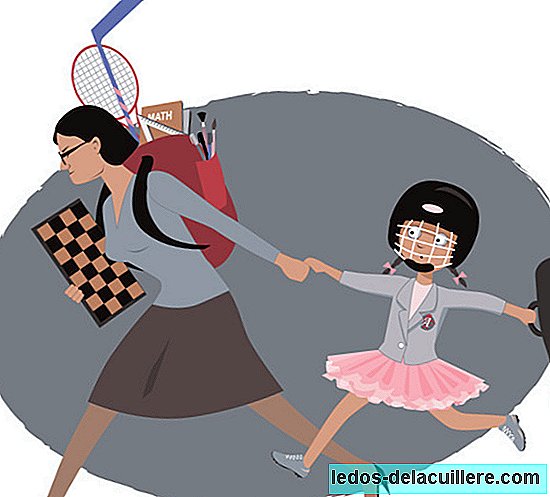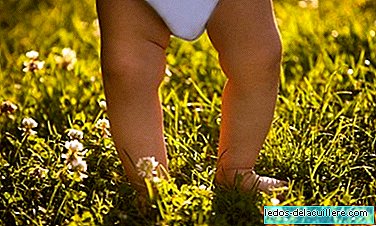Extracurricular activities that fill the agenda, hours of academy and study to obtain high grades in school ... do you recognize yourself? Can you imagine a life without these demands for children? Maybe you would be happier? A study reveals that parents who have high levels of demand regarding their children's academic results are more unhappy than those who live more "relaxed."
Being inflexible can lead us more easily to frustration and that without taking into account children who, in these cases, seem to be the first ones harmed by an excess of stress and a lack of leisure time when studies direct their entire lives.
These are parents who always want more of their children, as we saw in the "method" of the fierce authoritarianism of Amy Chua about which Armando already spoke to you and who proposes an educational model too uncompromising, without free time for children to enjoy what they most like.
The study has been published by the Queen Mary University of London and shows that children who suffer from this childhood could be marked for life by living in an environment dominated by stress and unhappiness. It is logical that the state of the parents influence the children and the parental practices directly affect them.

Demanding mothers (or fathers), unhappy children
The study focuses on mothers, but data is also provided regarding men, and ensures that they are also more unhappy. It is an "emerging trend" that parents who take care of their children intensely feel less happy. And, in the face of similar situations (men who are primary caregivers or principal responsible for children and do so in a demanding manner) the result would also be the same and hence the headline, "unhappy parents."
Because, as in a mirror, mothers or unhappy fathers, mothers or dissatisfied fathers, is equal to unhappy and dissatisfied children. There are studies that indicate that postpartum depression can have cognitive and emotional effects in the newborn in the short and long term, how will they not affect the emotions of the parents when the children are older?
This is suggested by one of the authors of the study, Professor Almudena Sevilla, from the University of Oxford, who explains the results in her blog in an article that relate "intensive motherhood" to miserable mothers. The research, entitled "Intensive Motherhood and Welfare: The role of education and child care activity" was conducted through a large set of data from the United States on the welfare and happiness of mothers.
Another curious fact that is extracted from the research is that mothers with a lower educational level and with low income are less likely to carry out an "intensive" type maternity, perhaps because it entails a low level of demand if they accumulate other sources of worries and stress (which would contribute, on the other hand, to make it harder to get out of your economic gap).
In contrast, mothers with a higher educational level reported lower levels of momentary well-being in the care of their children. The more years of schooling the mothers had had, the lower their levels of happiness were and the higher their levels of stress and fatigue. However, mothers with a university degree spent more time with their children (16 hours per week compared to 12 hours for mothers with a high school degree).
These mothers with more training devoted more time to the extracurricular activities of their children, as well as to help them in their studies in the face of future access to the university (we do not know the ages of the children). Naturally, they have less free time and can feel more pressure in their day-to-day life, the result of a social expectation (what they expect / expect from my son), which would have an impact on their well-being. Thus, in these cases the amount of time would not give quality of time.
With regard to men, as we have pointed out, they also give less value to their intense task of caring for children and those with higher education compared to other men with less training feel more unfortunate.
On the other hand, the "psychological cost" that this parenting style has in one of the parents (or both) can also affect the couple's relationship, with new risks to family stability and happiness.
And what makes us happier?
The study also showed that if what we want is to be happier (and that our children are) what works is have a lot of conversation with them, reasoning and intellectually stimulating activities such as reading and support in the game and its tasks. Of course, as long as we do it "willingly" and not with stress. On the other hand, he points out that generally working mothers bring benefits to children thanks to the increase in family income.
For all this, the co-author of the research has worked hard to highlight that these data should raise the alarm about parenting methods and gurus that promote "intense" parenthood, in the style of "tiger mothers," Amy Chua's style, but I would say not even in such an extreme way. Because the pressure on children, seeking their "excellence", does not have to give us or give them well-being.
It also demands social policies that do not overlook these data, that are set in the well-being of children and that take into account that the well-being of parents is important and should be invested in their support, not leave these issues abandoned and that neither Take on the priority list.
Anyway, now that it arrives the extracurricular era, remember that it is convenient to ask the children what they want to do and, as far as possible, not charge them for hours, attend to their tastes so that these activities are not counterproductive. Nor do we create expectations for years before, with our young children, do we have to think about college? In English essential for your job?
And if lately we feel that we are stressed too much with what we want our son to achieve, because we lack time, we are tired, often in a bad mood and that "goal" never seems to come, maybe we should stop to think Am i happy this way? Is my son? What is the most important goal?
Photos | iStock
More information | Child and family blog
In Babies and more | The more unhappy a child is, the more materialistic it is (and the more materialistic it is, the more unhappy), All children are happy unless parents make them unhappy, Extracurricular activities: in their fair measure












